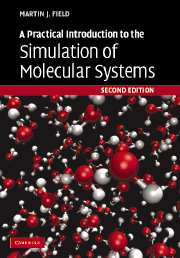Book contents
- Frontmatter
- Contents
- Preface to the first edition
- Preface to the second edition
- 1 Preliminaries
- 2 Chemical models and representations
- 3 Coordinates and coordinate manipulations
- 4 Quantum chemical models
- 5 Molecular mechanics
- 6 Hybrid potentials
- 7 Finding stationary points and reaction paths on potential energy surfaces
- 8 Normal mode analysis
- 9 Molecular dynamics simulations I
- 10 More on non-bonding interactions
- 11 Molecular dynamics simulations II
- 12 Monte Carlo simulations
- Appendix 1 The pDynamo library
- Appendix 2 Mathematical appendix
- Appendix 3 Solvent boxes and solvated molecules
- Bibliography
- Author index
- Subject index
Appendix 1 - The pDynamo library
Published online by Cambridge University Press: 03 December 2009
- Frontmatter
- Contents
- Preface to the first edition
- Preface to the second edition
- 1 Preliminaries
- 2 Chemical models and representations
- 3 Coordinates and coordinate manipulations
- 4 Quantum chemical models
- 5 Molecular mechanics
- 6 Hybrid potentials
- 7 Finding stationary points and reaction paths on potential energy surfaces
- 8 Normal mode analysis
- 9 Molecular dynamics simulations I
- 10 More on non-bonding interactions
- 11 Molecular dynamics simulations II
- 12 Monte Carlo simulations
- Appendix 1 The pDynamo library
- Appendix 2 Mathematical appendix
- Appendix 3 Solvent boxes and solvated molecules
- Bibliography
- Author index
- Subject index
Summary
The algorithms and capabilities of the pDynamo library discussed in this book represent only a portion of those that are available. The choice of which to include has been highly subjective and, due to space restrictions and the perseverance of the author (!), relatively small. The topics that I most regret omitting or skimping upon include density functional theory, the calculation of surfaces and volumes, continuum methods for including solvation effects, non-equilibrium methods, especially those for the determination of free energies, and enhanced methods, such as transition path sampling, for the investigation of chemical reactions and other rare events. In any case, readers are encouraged to investigate these and alternative methods themselves, for many of the techniques presented in the book are the subject of active research and are undergoing continual improvement.
pDynamo itself and the example programs described in the text are available on the World Wide Web. At the time of publication, the appropriate addresses were www.ibs.fr and www.pdynamo.org. The websites give full details about how to download, install and use the library and the types of machines upon which it has been tested.
For convenience, we include here tables of the methods and attributes of the System class and of the other classes and functions that were encountered in the book along with the section in which they were first described or in which significant new capabilities were introduced. These are in Tables A1.1, A1.2 and A1.3, respectively. The System class is, in many ways, the central class of the library although it has several other important features which could not be treated in the text.
Information
- Type
- Chapter
- Information
- A Practical Introduction to the Simulation of Molecular Systems , pp. 294 - 297Publisher: Cambridge University PressPrint publication year: 2007
